
by Fiona Biedermann (Australia) | Dec 16, 2013 | 2013, Being Thankful, Childhood, Domesticity, Grandparent, Kids, Life Balance, Life Lesson, Me-Time, Oceania, Older Children, Parenting, Pregnancy, Siblings, Sleep, Sleep and Children, Womanhood, Working Mother, World Motherhood
 Twenty five years ago today I became a mother for the first time. In some ways it feels like a lifetime ago and in some ways it feels like only yesterday that I was gazing at the face of my oldest son, in both awestruck wonder and sheer terror.
Twenty five years ago today I became a mother for the first time. In some ways it feels like a lifetime ago and in some ways it feels like only yesterday that I was gazing at the face of my oldest son, in both awestruck wonder and sheer terror.
I was seventeen years old and I thought I knew it all, as only a teenager can believe. How wrong I was.
Motherhood is the biggest learning curve any woman can embark on and there is no right or wrong. If you love your child, can keep him safe from any major harm and bring him up to be a halfway decent human being, than I think you’re doing alright.
Then again, sometimes all the right parental steps in the world can’t prevent what life throws at us or what our children become.
The thing is, in my case, if I were to do the motherhood thing over again, I’m not sure that there’s a whole lot I would do differently. Although given a chance, I probably wouldn’t be quite so hard on myself and I’d probably take a little bit more time out for me.
As a young mother I felt like I was constantly having to prove myself, I had to try just a little bit harder, put in a just a little bit more effort, complain a little bit less – basically just suck it up and get on with the job of being a mum to prove everyone wrong.
I was my own toughest critic and at times I could beat myself up better than anyone else about how I was failing as a mother.
The truth is, I wasn’t failing as a mother, and I never did. One of my son’s girlfriends once told me how terrified she was that she wouldn’t be a good mum. I told her the very fact that she was worried that she wouldn’t be meant that she would be fine.
As a mother, you do the best you can with what you have.
I believe that no-one can say what is right or wrong about motherhood. Breast fed baby or bottle fed baby, working mum versus stay-at-home-mum. How we raise our children is our choice and that is what contributes to a world full of people with different personalities, who have a multitude of experiences and knowledge to add to the great big melting pot of people.
Yes I’m feeling slightly nostalgic as we celebrate my oldest baby’s birthday today. I consider many of my friends who now have young children and I wonder whether it would have been wiser (like them) to wait until we were better off financially and more established in our careers and life experience.
When our friends were marching up the career ladder, partying hard and taking overseas holidays; hubby and I were having sleepless nights and staying at home making our own fun and eating home cooked meals.
Then I consider the fact that my children didn’t want for the important things, they had food in their bellies, a roof over their heads and a wealth of love and good times. Yes we struggled financially and stress kept me awake on many long nights. My kids might not have had expensive toys and name brand clothes, but they grew up loving the outdoors and learning to make their own fun.
The best things in life definitely were free – money can’t buy things like imagination, sunshine, nature and water.
Now at the age of 42, I’m ready to start living my life. In the last few years I’ve had to sprint up the career ladder to catch up with others my age and that’s had its own set of challenges as well. The good thing is, my youngest baby is now 16 and I’m still youthful enough to enjoy my life and all the challenges which lie ahead.
Besides when I get nostalgic for babies, I now have my grandchildren to love and adore and the energy to still enjoy them – not to mention the added benefit of being able to hand them back.
The reality is, if I had my time to do over again, I wouldn’t change a thing.
What about you, are there things even now, which you know you would do differently?
This is an original World Moms Blog post by Inspiration to Dream of Adelaide, South Australia. Fiona is the writer of Inspiration to Dream and can be found writing or reading in every spare moment that isn’t filled up with work and her three boys, and of course with a bit of spare time thrown in for hubby as well.
Image credit to Cliparto This image has been used within the terms of use from Cliparto

Fiona at Inspiration to Dream is a married mother of three amazing and talented MM’s (mere males, as she lovingly calls them) aged 13, 16 and 22, and she became a nana in 2011!
She believes she’s more daunted by becoming a nana than she was about becoming a mother! This Aussie mother figures she will also be a relatively young nana and she’s not sure that she’s really ready for it yet, but then she asks, are we ever really ready for it? Motherhood or Nanahood. (Not really sure that’s a word, but she says it works for her.)
Fiona likes to think of herself as honest and forthright and is generally not afraid to speak her mind, which she says sometimes gets her into trouble, but hey, it makes life interesting. She’s hoping to share with you her trials of being a working mother to three adventurous boys, the wife of a Mr Fix-it who is definitely a man’s man and not one of the ‘sensitive new age guy’ generation, as well as, providing her thoughts and views on making her way in the world.
Since discovering that she’s the first blogger joining the team from Australia, she also plans to provide a little insight into the ‘Aussie’ life, as well. Additionally, Fiona can be found on her personal blog at Inspiration to Dream.
More Posts

by Tara Bergman (USA) | Dec 6, 2013 | Cooking, Death and Dying, Family, Food, Grandparent, Home, Siblings, Tara B., World Motherhood
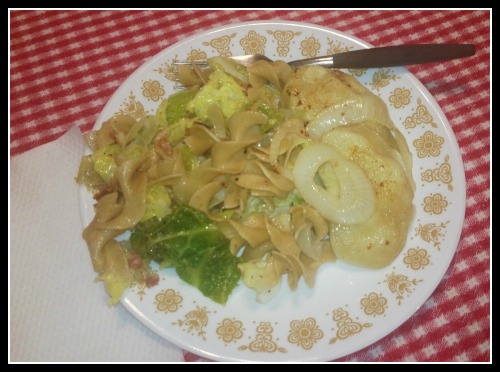 Recently, my Gram passed away at 92 years old. She was remarkable in many ways, but her cooking is one of the things that stood out to anyone who knew her. It wasn’t just what she made, which was always delicious, but it was also how she made it.
Recently, my Gram passed away at 92 years old. She was remarkable in many ways, but her cooking is one of the things that stood out to anyone who knew her. It wasn’t just what she made, which was always delicious, but it was also how she made it.
My Gram was very much the matriarch of our family, and for years she hosted most of the holiday meals in her half of a double block home. She would get up at 3 AM to start cooking everything from scratch.
She was Polish, so many of her dishes came from that influence, although she could also whip out an amazing lasagna or cheesecake. Whatever was on the menu, she would work for days preparing and then serve us all in her dining room while she ate in the kitchen. (more…)
Tara is a native Pennsylvanian who moved to the Seattle area in 1998 (sight unseen) with her husband to start their grand life adventure together. Despite the difficult fact that their family is a plane ride away, the couple fell in love with the Pacific Northwest and have put down roots. They have 2 super charged little boys and recently moved out of the Seattle suburbs further east into the country, trading in a Starbucks on every corner for coyotes in the backyard. Tara loves the outdoors (hiking, biking, camping). And, when her family isn't out in nature, they are hunkered down at home with friends, sharing a meal, playing games, and generally having fun. She loves being a stay-at-home mom and sharing her experiences on World Moms Network!
More Posts

by Katinka | Dec 5, 2013 | 2013, Adoption, Adoptive Parents, Being Thankful, Belgium, Childhood, Cultural Differences, Culture, Education, Eye on Culture, Family, International, Kids, Life Lesson, Motherhood, Multicultural, Netherlands, Parenting, Penguin and Panther, Politics, Siblings, Traditions, Turkey, United Nations, World Events, World Motherhood, Younger Children
 As an adoptive mother of an Ethiopian Panther, I’ve grown an extra pair of antennas when it comes to racism.
As an adoptive mother of an Ethiopian Panther, I’ve grown an extra pair of antennas when it comes to racism.
Truly, a lot of really nice people distinguish my daughter from other children, based on her color. Even if it is meant to defend her, like calling me disgusting for letting her carry the groceries, it basically still is hidden racism. Should I tell her that people believe she shouldn’t be helping me out because it reminds them of slavery while her white brother is allowed to do the same chores? I’d rather have people call me names than let them wreck my daughter’s self esteem.
However, as I’m writing this, there is a HUGE racism debate going on in Belgium and even worse in The Netherlands, where it all started. And despite my racism antennas, I just can’t fully agree with the racism-yellers this time. Not even if they yell all the way from some United Nations office.
The debate is all about the ancestor of Santa Claus: Sinterklaas. You can read here about how Santa Claus evolved from our Sinterklaas, or Saint Nicholas, who is actually believed to be Turkish, who resides in Spain, has a white horse called Bad-Wheater-Today (Belgium) or Amerigo (The Netherlands), and celebrates his December birthday by coming over to our countries and surprising children with presents.
In the Netherlands he comes over on the evening of December 5th. Later that night, he comes to Belgium and delivers toys and sweets to be found in the children’s shoes on the morning of the 6th. It’s really a children’s celebration, full of magic and anticipation. You will bump into him just about everywhere during November.
Now, because Sinterklaas is getting old and forgetful, and has a lot of work to do within 24 hours, he has helpers. These helpers are all black, and hence all called ‘Black Peter’ (Zwarte Piet).
And that’s where all the accusative fingers point.
Indeed, this tradition can be seen as offensive. I, for a fact, believe it is partly based on a slavery and stereotype-loaded past, and a lot of people agree with me. Black Peter has long been depicted as a bit slow, barbaric (kidnapping and hitting the naughty children), dressed in clownish clothes, with stout lips and being submissive to his white boss.
Of course I agree this is an awful, insulting picture to brainwash our children with during the big Sinterklaas-Awaiting-Month-of -November. I also agree an outsider would be shocked, when he meets Sinterklaas and his Black Peters for the first time, especially if oblivious to the folklore. And I honestly understand and feel the offense people take.
For me personally, Sinterklaas has me cringing with bittersweetness ever since I found out about his racist taint. I’m not even particularly fond of the Sinterklaas tradition anymore.
However, I also don’t agree that we are teaching our children racism, nor paying ode to slavery by honoring this tradition every year. Not any more, that is.
Since the 1990’s, we have a children’s holiday special on TV portraying the real story. Children are elegantly taught Black Peter is black – and not brown/colored/african – because he came down the chimney. No more, no less. Nobody really tries to explain why his clothes didn’t get black during his journey down the chimney.
It is just part of the mystery, just like Bad-Wheater-Today walking on rooftops or Sinterklaas having this enormous book in which the good and bad behavior of every single child is listed. It doesn’t make sense, but children buy it anyway.
In this TV-special, Sinterklaas is depicted as a bit senile. In fact his Black Peters are now the smart ones, all with different names according to their function or character. A bit like the Smurfs, and everyone likes the Smurfs, right?
For the past 20+ years, this special comes on every November. Along the way, children started to grow more afraid of this very strict and grumpy old man than of his joyous, candy throwing helpers. The Black Peters became the true friends of our children. And every Belgian child you ask about Black Peter’s color now, will patiently tell you the chimney-story.
To me, this shows our tradition is evolving from, I admit, a racist past, towards a new story. Just like it evolved into Santa Claus overseas—who, by the way, appears to imprison a whole lot of innocent, little people in a Siberia-like, harsh environment without paying them for their round-the-clock labor.
Therefore, I trust society may even evolve towards a tradition of White Peters in a few more years or decades. After all, with more and more houses being built without huge chimneys, we will sooner or later find out that Peter’s color is fading, won’t we?
I’m hoping that by the time this post runs, all the petitions –pro and con–the social media frenzy, any UN investigations and any public manifestations, will be over and done with. I truly hope no-one got hurt along the way, and that both camps have reached a certain level of understanding towards each other by the time Saint Nicholas wants to celebrate his birthday.
Because, you know, my children are already expecting Sinterklaas to send one of his Peters down our chimney on the 6th of December. Especially my very dark daughter is impatiently awaiting. I’d hate to disappoint her if he decided not to come this year, because he’s afraid to be called a racist. She would definitely not understand, mainly because she doesn’t see any resemblance between Black Peter and herself.
I’m confident Sinterklaas will make it, though. We are both alike, Sinterklaas and me. We’re already used to people calling us racist slave handlers. And we both know better than that.
Did you know about Santa Claus’s European past? How would you feel if he had black helpers instead of elves?
This is an original post to World Moms Blog by K10K from The Penguin and The Panther.
The picture in this post is credited to Sinterklaas Himself, who published it on Wikipedia, while undercover as Gaby Kooiman, under GNU Free Documentation License.
If you ask her about her daytime job, Katinka will tell you all about the challenge of studying the fate of radioactive substances in the deep subsurface. Her most demanding and rewarding job however is raising four kids together with five other parents, each with their own quirks, wishes and (dis)abilities. As parenting and especially co-parenting involves a lot of letting go, she finds herself singing the theme song to Frozen over and over again, even when the kids are not even there...
More Posts

by Tinne from Tantrums and Tomatoes | Nov 11, 2013 | 2013, Being Thankful, Belgium, Childhood, Competition, Contest, Education, Family, Girls, Husband, Life Lesson, Parenting, Relationships, Siblings, Tantrum and Tomatoes, World Motherhood, Younger Children
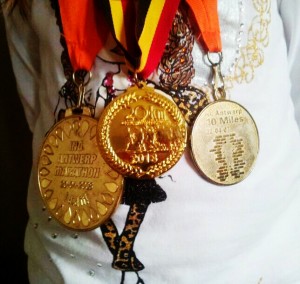 There is no denying that my eldest child is competitive.
There is no denying that my eldest child is competitive.
Fiercely competitive.
The kind which makes for a future Olympic-Gold-Medal winner – competitive.
She needs to be first. Perhaps it has something to do with the fact that she is the oldest, but I suspect it is just part of her genetic make up.
Her father has the same drive to always do better than the rest, to drive himself towards new goals, to be better, faster, to force his body into running a marathon and to try to improve his time again and again and again. And he is willing to suffer for it, to endure muscle cramps, to run until his energy levels have been completely depleted and he is more dead than alive.
I’m not like that, neither is n°2. We are happily just pottering about, going about our business and we will get there in the end. So what if it takes us hours, weeks or months. So what if we don’t finish first. We ran, didn’t we? We did our part. Besides I do not like discomfort, mentally or physically.
Like so many characteristics, my daughter’s competitiveness is a two sided sword.
It is what drove her to learn how to ride a bike without training wheels in just two days, simply because a boy in her class could do it and if that boy could do it then there was no reason why she shouldn’t be able to as well.
It got her out of diapers so quickly simply because her friend was also potty training and she wanted to be first.
But there is a downside as well. Being only four, she aims to be first in just about everything she does. And I really do mean e-ve-ry-thing . Whether it is rolling in the dust, dressing herself, putting olives on a pizza, eating said pizza, learning how to count to 20, spelling out her own name AND that of mommy, to her it is a competition. She will try to ‘win’ at it, do a victory dance when she ‘wins’ and be inconsolable when she doesn’t.
There have been many conversations about how winning is nice but not so important that you need to bawl your eyes out when some other kid takes the prize and that she cannot always be first. That is OK not to always win, not to be top in everything and that there are some things, that I’m sorry my dear darling, you will not be able to do.
This – I have to admit – will be a though lesson for her to learn. And she will have to learn it, otherwise she’ll be a pill-popping, nervous wreck by the time she is 16.
And she will have to find a way to turn that competitiveness into something positive.
But there is the glitch in the whole affair. How will she learn?
Through experience? Will it just click one day? Will she simply just realize that she is not musical (she has inherited my signing voice, which sounds like a chorus of warthogs high on helium), that she cannot really jump that high. Will she be sad, will she cry, will she regret it her whole life or… will she just simply accept. Accept that yes, she sucks at music, dancing, mathematics, but hey, she has a knack for drawing awesome portraits and makes a killer brownie, so what the heck …
How did you or your child come to terms with the fact that there is something that you or s/he just is not good at?
This is an original post to World Moms Blog from our mother of two in Belgium, Tantrums and Tomatoes.
Born in Belgium on the fourth of July in a time before the invention of the smart phone Tinne is a working mother of two adorably mischievous little girls, the wife of her high school sweetheart and the owner of a black cat called Atilla.
Since she likes to cook her blog is mainly devoted to food and because she is Belgian she has an absurd sense of humour and is frequently snarky. When she is not devoting all her attention to the internet, she likes to read, write and eat chocolate. Her greatest nemesis is laundry.
More Posts - Website
Follow Me:



by Karyn Wills | Nov 4, 2013 | Being Thankful, Brothers, Childhood, Family, Family Travel, Friendship, Home, Inspirational, Kids, New Zealand, Older Children, Parenting, Relationships, Siblings, Traditions, Travel, Uncategorized, Vacationing, World Motherhood, Younger Children
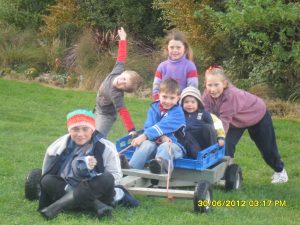 I have three sons and they are a lot of fun. They are also a lot of noise, mess and busyness.
I have three sons and they are a lot of fun. They are also a lot of noise, mess and busyness.
They adore one another most of the time and loathe one another at other times. Needless to say, living in a small house can get a little hectic and the fact that we live a car trip away from most of the boys’ friends—and I don’t always want to drive to fetch or deliver children—means that, from time to time, my boys can have a little too much of one another.
We are one small family and that can make us all tiresome to one another – no matter how strong the love between us.
The healthiness of living in an isolated, nuclear family unit has always bothered me a little. Not that living with my extended family or my in-laws would suit me, or them I suspect, either. But the cousins. Oh my goodness. The wonder of having cousins around – that appeals to me.
With cousins there is the common bond of grandparents and other family members, and the common history and the common family rituals. There is the emotional connection of knowing they all belong together, and the emotional connection of having been all together for their life times.
But, what I really love is the bond I see between our boys and all of their cousins in terms of visible affection and loyalty. When we have been away on holiday together, older cousins have often taken our boys off for adventures or have played with them, especially as babies and toddlers, so I could have a break. Younger cousins provide opportunities for my older boys to teach and help, in their turn. Sometimes it’s just fun to hang out together.
With their cousins, my boys are learning that things their brothers have said to them repeatedly, and they have ignored, are often the same opinions of others – and their cousins are not afraid to tell them so, sometimes bluntly. They are learning a higher level of co-operative skills and greater negotiation techniques, than they get to use with just two others. They are learning to walk away, when they need to walk away, and they are learning when it is appropriate to comment on another’s behaviour and when it is best to stay silent.
Like their brothers, their cousins love them. Unlike their brothers, their cousins are listened to. Like their friends, their cousins enjoy playing with them and will tell them to go away, when they‘ve had enough – but only for a short while. Unlike their friends, they cannot be transient members of their lives. And that last point, in particular, I love.
Do your children have good relationships with their cousins? Do you see a deeper bond between your children and their cousins, than with their friends?
Karyn is a teacher, writer and solo mother to three sons. She lives in the sunny wine region of Hawke’s Bay, New Zealand in the city of Napier.
More Posts
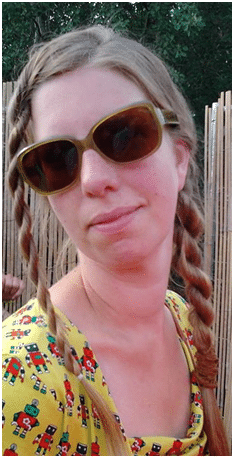
by Katinka | Oct 21, 2013 | Adoptive Parents, Being Thankful, Belgium, Birth Parents, Childhood, Cultural Differences, Domesticity, Family, International, Interviews, Kids, Penguin and Panther, Relationships, Siblings, Special Needs, Uncategorized, Working Mother, World Moms Blog Writer Interview, Writing, Younger Children
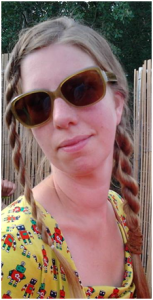 Where in the world do you live? And, are you from there?
Where in the world do you live? And, are you from there?
I was born, raised and proudly remain stuck in the Belgian mud. I would sometimes dream about moving abroad, but it turns out I’m quite happy staying right here. I do like to travel several times a year, mostly for work.
What language(s) do you speak?
My mother tongue is Flemish (which is basically the same as Dutch), but with Belgium being a trilingual country, I also speak French and I can understand German. Obviously, I also speak – and write – English. About ten years ago I also decided to learn Indonesian, but all I remember of it now are the words kamar kecil, which means I can actually ask where the bathroom is if I would make it to Indonesia one day.
In addition, I would love to learn how to read and write music, and to understand Amharic, the first language of our daughter.
When did you first become a mother?
This is a tricky one, because in my experience, I can call on two firsts. Two totally different ways of expecting a child, of becoming a mother, both wonderful and intense. In 2006, I first became a mother when our son was born, the one I love to call our cuddly Penguin. Five years later, in 2011, I first became an adoptive mother when we brought our two-year-old daughter home, our darling Panther.
Is your work, stay-at-home mom, other work at home or do you work outside the home?
Apart from being a full time mom, full time housekeeper and full time wannabe writer, I also have a full time job outside my home. Some might even say I’m building an exciting career as a geomicrobiologist, enabling me to go on missions abroad and to research amazing subjects, but they should know that my favorite moments are without doubt coming home, be it after a working day or a business trip.
Why do you blog/write?
I started blogging (in Flemish) during our adoption procedure, merely as a way to keep friends and relatives posted on any news we would get in those long years. Along the way, blogging became a kind of therapy, enabling me to vent frustrations and personal struggles, or to focus on optimism and fun facts. I also learned just how much I loved to write.
I kept on blogging until our daughter was home for two years. I recently decided to stop, mostly for the privacy of my children and because I felt like I was getting ‘addicted’ to blogging. It was a hard decision, disappointing to quite some readers who liked the plain honesty in my writing. But, as a go-between, I decided to start a low frequency, anonymous, English blog about life with my Penguin and Panther, and to contribute to WMB every once in a while. And in the extra spare time I have now, my newest endeavor is to write children’s books, which has long been a dream of mine.
How would you say that you are different from other mothers?
As a typically modest Belgian, I truly find it awkward to differentiate myself that way. I don’t believe I have something special about me as a mother, or a person for one. But since I have to, well, I guess I would be different from other mothers because my kids come in two opposite colors and with some extra needs. Our blond haired Penguin is an overly sensitive philosopher who understands more than is good for him, while our curly Ethiopian Panther deals with attachment, anxiety and health issues. They leave me both exhausted and enriched every single evening, but I guess that’s no difference to other mothers…
What do you view as the challenges of raising a child in today’s world?
I don’t even know where to begin! Every day is a challenge, when raising children, isn’t it? One of my major concerns though, is to let our children remain children as long as possible. I strive to keep a delicate balance between guarding my children innocence and purity, and still teaching them about the need for respect and care for the less fortunate or for our struggling environment. With today’s society going so fast, having everything within reach, leaving nothing to the imagination, I try to create an island of simplicity and ‘slowness’ for our children (and ourselves!) at home, where they can develop at their own pace. But when time comes, I still want them to be able to catch one of society’s speed boats that are racing by our island…
How did you find World Moms Blog?
I just bumped upon WMB through a cartoon someone shared. I think. My kids often beat me at ‘Memory’, so I can’t be sure about it. But I do remember I started reading and reading and couldn’t stop for another hour.
This is an original interview of our new writer in Belgium, K10K – pronounce it as Ka-ten-ka and you will come quite close to her real name – from The Penguin and The Panther
The image used in this post is credited to the author.
If you ask her about her daytime job, Katinka will tell you all about the challenge of studying the fate of radioactive substances in the deep subsurface. Her most demanding and rewarding job however is raising four kids together with five other parents, each with their own quirks, wishes and (dis)abilities. As parenting and especially co-parenting involves a lot of letting go, she finds herself singing the theme song to Frozen over and over again, even when the kids are not even there...
More Posts

 Twenty five years ago today I became a mother for the first time. In some ways it feels like a lifetime ago and in some ways it feels like only yesterday that I was gazing at the face of my oldest son, in both awestruck wonder and sheer terror.
Twenty five years ago today I became a mother for the first time. In some ways it feels like a lifetime ago and in some ways it feels like only yesterday that I was gazing at the face of my oldest son, in both awestruck wonder and sheer terror.

 Recently, my Gram passed away at 92 years old. She was remarkable in many ways, but her cooking is one of the things that stood out to anyone who knew her. It wasn’t just what she made, which was always delicious, but it was also how she made it.
Recently, my Gram passed away at 92 years old. She was remarkable in many ways, but her cooking is one of the things that stood out to anyone who knew her. It wasn’t just what she made, which was always delicious, but it was also how she made it.












